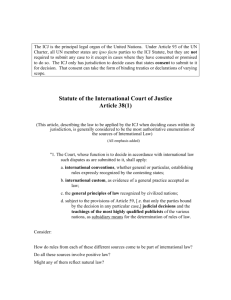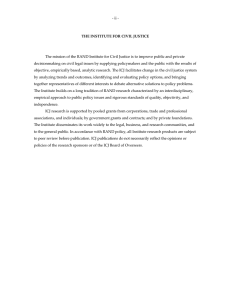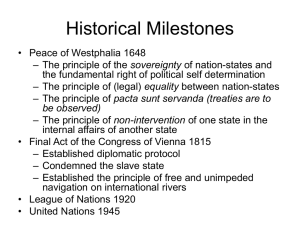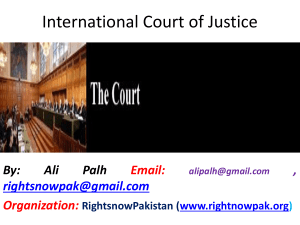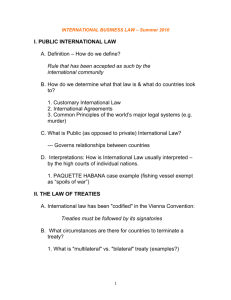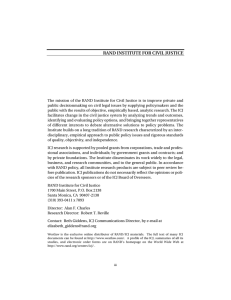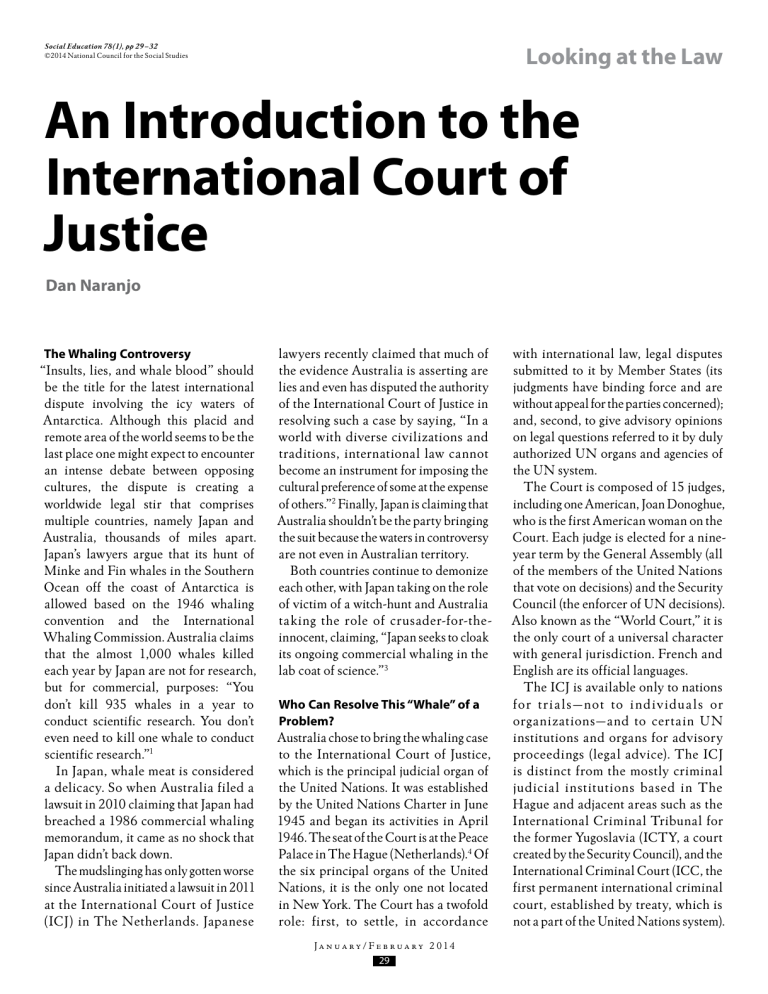
Social Education 78(1), pp 29–32 ©2014 National Council for the Social Studies Looking at the Law An Introduction to the International Court of Justice Dan Naranjo The Whaling Controversy “Insults, lies, and whale blood” should be the title for the latest international dispute involving the icy waters of Antarctica. Although this placid and remote area of the world seems to be the last place one might expect to encounter an intense debate between opposing cultures, the dispute is creating a worldwide legal stir that comprises multiple countries, namely Japan and Australia, thousands of miles apart. Japan’s lawyers argue that its hunt of Minke and Fin whales in the Southern Ocean off the coast of Antarctica is allowed based on the 1946 whaling convention and the International Whaling Commission. Australia claims that the almost 1,000 whales killed each year by Japan are not for research, but for commercial, purposes: “You don’t kill 935 whales in a year to conduct scientific research. You don’t even need to kill one whale to conduct scientific research.”1 In Japan, whale meat is considered a delicacy. So when Australia filed a lawsuit in 2010 claiming that Japan had breached a 1986 commercial whaling memorandum, it came as no shock that Japan didn’t back down. The mudslinging has only gotten worse since Australia initiated a lawsuit in 2011 at the International Court of Justice (ICJ) in The Netherlands. Japanese lawyers recently claimed that much of the evidence Australia is asserting are lies and even has disputed the authority of the International Court of Justice in resolving such a case by saying, “In a world with diverse civilizations and traditions, international law cannot become an instrument for imposing the cultural preference of some at the expense of others.”2 Finally, Japan is claiming that Australia shouldn’t be the party bringing the suit because the waters in controversy are not even in Australian territory. Both countries continue to demonize each other, with Japan taking on the role of victim of a witch-hunt and Australia taking the role of crusader-for-theinnocent, claiming, “Japan seeks to cloak its ongoing commercial whaling in the lab coat of science.”3 Who Can Resolve This “Whale” of a Problem? Australia chose to bring the whaling case to the International Court of Justice, which is the principal judicial organ of the United Nations. It was established by the United Nations Charter in June 1945 and began its activities in April 1946. The seat of the Court is at the Peace Palace in The Hague (Netherlands).4 Of the six principal organs of the United Nations, it is the only one not located in New York. The Court has a twofold role: first, to settle, in accordance J a n u a r y / F e b r u a r y 2 0 14 29 with international law, legal disputes submitted to it by Member States (its judgments have binding force and are without appeal for the parties concerned); and, second, to give advisory opinions on legal questions referred to it by duly authorized UN organs and agencies of the UN system. The Court is composed of 15 judges, including one American, Joan Donoghue, who is the first American woman on the Court. Each judge is elected for a nineyear term by the General Assembly (all of the members of the United Nations that vote on decisions) and the Security Council (the enforcer of UN decisions). Also known as the “World Court,” it is the only court of a universal character with general jurisdiction. French and English are its official languages. The ICJ is available only to nations for trials—not to individuals or organizations—and to certain UN institutions and organs for advisory proceedings (legal advice). The ICJ is distinct from the mostly criminal judicial institutions based in The Hague and adjacent areas such as the International Criminal Tribunal for the former Yugoslavia (ICTY, a court created by the Security Council), and the International Criminal Court (ICC, the first permanent international criminal court, established by treaty, which is not a part of the United Nations system). In this March 25, 2011 photo, Japan’s whaling ship Nisshin Maru leaves a port in Tokyo, for the water off Miyagi Prefecture. In June 2013, Australia opened its case at the International Court of Justice, arguing that Japan’s annual hunt in the icy waters around Antarctica is an illegal commercial activity outlawed since 1986 by an International Whaling Commission moratorium. (AP Photo/Itsuo Inuye, File) How Does the ICJ Work? Why Did Australia Choose This Course of Legal Action? In order for the ICJ to hear a case it must first have jurisdiction. There are three ways a nation can accept the Court’s jurisdiction: (1) a special agreement (two nations simply agreeing to take the case to the ICJ); (2) a clause in a treaty accepting the ICJ jurisdiction in case of dispute; and (3) a simple consent by a nation to the Court’s jurisdiction. The Court first hears oral proceedings, which are open to the public, after which the judges (and only the judges) retreat into private quarters to discuss a ruling. Once the ruling is announced, there are no appeals and the ruling is final. The sources of law that the Court must apply are: international treaties and conventions in force; international custom; the general principles of law; and judicial decisions and the teachings of the most highly qualified “publicists” (experts in public or international law). Oral proceedings may take several days and involve several witnesses and experts. It may take many years from the beginning of the case (application for the Court to take the case) until the final ruling. For instance the Australia v. Japan whaling case was initiated in 2010 and a final ruling had not been handed down at the time of publication of this article. So why did Australia choose this forum to bring the whaling case? There are numerous reasons why the ICJ is well suited for such a dispute. First, such proceedings are public and garner international attention. Thus, Japan could feel pressure when more eyes are on its whaling practices. Second, both Japan and Australia are members of the United Nations, thus both would accept a decision by the Court. Third, the dispute involves the interpretation of treaties signed by both parties. The Court has extensive experience in this type of dispute. And finally, practically speaking, there is no other court in the world that could rule on something that involves two countries with two different legal systems and cultural values concerning these large marine mammals. How are rulings enforced? Each S o c i a l E d u c at i o n 30 member of the United Nations has signed the Charter agreement to become a member. Within the Charter, there is a clause agreeing to accept the ICJ’s decision; thus, once the Court determines it has jurisdiction, it is rare that a decision is ignored. The Court has heard cases involving World War II reparations, territorial disputes, environmental disputes, and criminal proceedings over foreign nationals. 5 Aside from cases, the United Nations may also have the Court decide an international legal issue. These legal issues are called “Advisory opinions.” One example is the 2003 “Legal Consequences of the Construction of a Wall in the Occupied Palestinian Territory.”6 The Court’s jurisdiction and legal topics vary greatly. The ICJ and United States Relationship: An International Soap Opera The relationship between the United States and the ICJ is similar in many ways to a television soap opera storyline, in which a friend betrays another friend. In the past the United States has used the ICJ to resolve issues such as a territory dispute with Canada in 1981.7 However, in 1984 a very controversial case came to the ICJ involving the United States and Nicaragua. The case, Nicaragua v. United States, concerned U.S. military efforts in Nicaragua in the 1980s.8 The United States was extremely unhappy with the ICJ ruling, and since that 1984 case, the relationship between the two entities has been rocky. The Court ruled in Nicaragua’s favor and the United States refused to comply. Consequently, Nicaragua asked the UN Security Council to enforce the judgment (the Security Council here is similar to the police enforcing a judgment or warrant by a judge). However, since the United States has veto power on the Security Council, it vetoed any enforcement thus nullifying the UN capacity to impose the Court’s judgment.9 In 2003, Mexico brought suit against the United States at the ICJ over a Mexican citizen on death row in Texas.10 Mexico claimed that under the Vienna Convention, the United States was required to allow convicted rapist and murderer Jose Medellin the opportunity to talk to a Mexican consular official. According to Mexico, the United States had violated Medellin’s rights under the Vienna Convention. The ICJ agreed with Mexico, but the Texas Court of Criminal Appeals (the highest criminal court in the state) refused to give Medellin the relief he sought. The case would eventually lead to the U.S. Supreme Court. The Supreme Court later stated, “The Court further concluded that the president does not have inherent authority to enforce ICJ opinions against U.S. states.”11 In the legal world, this was a true slap in the face. In essence, the Supreme Court ruled that the ICJ couldn’t tell state criminal courts what to do because this right is given specifically to the states. J a n u a r y / F e b r u a r y 2 0 14 31 The feud between a world power and the ICJ has sparked an interesting debate over how much power the ICJ should have. Joan Donoghue, the first American woman to sit on the ICJ, has highlighted the importance of an international court to oversee several world problems. “There are some problems, like pollution of the oceans, that we can solve better jointly,” Donoghue said. “Besides,” she asked, “how can we order our life without international law? How can we fly to another country without international law? How are international adoptions handled without international law?”12 Recently, the United States has purposely attempted to construct treaties specifically excluding ICJ jurisdiction, as well as questioning the legality of the ICJ controlling American interests. Jenny Martinez, a Stanford law professor who once assisted a U.S. judge on an international criminal court for the former Yugoslavia, considers this Discussion Questions 1. How does the ICJ compare to courts in the United States? What is its jurisdiction? How are its decisions enforced? 2. How do you think the ICJ will rule in the Australia v. Japan whaling case? Do you think that Japan’s argument of whaling for research is persuasive? 3. Do you think the United States’ reactions to ICJ rulings have been appropriate? Why? What types of messages might the United States’ reactions send to other countries around the world? 4. Do you think there is a need for a judicial body like the ICJ? Why? How might the role of ICJ in the international community change in the future? Suggested Resources International Court of Justice www.icj-cij.org The official site of the World Court includes multimedia downloads, lists of past and current cases, as well as links to court documents. International Whaling Commission http://iwc.int/ The IWC is the international organization that regulates and monitors whaling around the world in accordance with international law. The site includes downloadable photos, international legal whaling documents, and news updates. “Into the Deep: America, Whaling, and the World,” American Experience www.pbs.org/wgbh/americanexperience/films/whaling This documentary explores the place of whaling in American history and culture, and offers a teaching guide with four separate lesson plans. Lessons include discussions of international law and today’s International Whaling Commission, as well as an analysis of Moby Dick and whaling in American history. “What is the International Court of Justice?,” included in Teaching International Law, Caroline Starbird, et al., eds., University of Denver, Center for Teaching International Relations, 2004, pp. 77–84. This lesson plan introduces the International Court of Justice, compares it to other courts, and explores the Court’s relationship with the United States. approach disingenuous. “When we (the United States) say we don’t have to participate or comply with international bodies and other people do, there’s a kind of hypocrisy in that,” she said.13 The Legal Times Are a-Changin’ As of this writing, the ICJ has yet to rule on the Australia/Japan case. The members of the ICJ have heard the arguments and are currently in deliberation. This decision, as all of the Court’s opinions, is significant because in an increasingly global world, a global arbitrator is critical. In this century, even as world populations increase, the metaphorical distance between nations is shrinking. Nations are participating in massive amounts of international trade. Information and goods can be transferred by the click of a button. Several major international issues that involve billions of people will come before the ICJ. Some of the issues will be related to the environment, oceans, wars, natural resources, and who or what governs outer space. What judicial system can oversee so many different legal systems and interests? The ICJ appears to be the best possible system thus far. Notes 1. Mike Corder, “Japanese Whaling Ban Urged by Australia in Highest U.N. Court,” The Huffington Post (June 26, 2013) www.huffingtonpost.com/2013/06/26/japanese-whalingban_n_ 3502842.html 2. “Japan Attacks Australian Role in Whaling Crusade,” The Guardian, (July 2, 2013) www.theguardian.com/environment/2013/jul/03/japan-australian-role-whal ing-crusade. 3. Corder. 4. The majority of this section is information taken from “How the Court Works” tab of the International Court of Justice website. Please refer to www.icj-cij.org for further information. 5. List of cases, available at www.icj-cij.org. 6. Advisory Opinions, available at www.icj-cij.org. 7. List of all cases, available at www.icj-cij.org. 8. “Military and Paramilitary Activities in and against Nicaragua (Nicar. v. U.S.),” Press Release, (Sept. 4, 1984) available at www.icj-cij.org. 9. “U.S. Vetoes Security Council Resolution on Nicaragua,” Associated Press, www.apnewsarchive.com/1984/US-Vetoes-Security-Council-Resolution-on-Nicaragua. 10. Margaret E. McGuinness, “Medellin v. Texas: Supreme Court Holds ICJ Decisions under the Consular Convention Not Binding Federal Law, Rejects Presidential Enforcement of ICJ Judgments over State Proceedings,” American Society of International Law (April 17, 2008) www.asil.org/insights/volume/12/issue/6/medellin-v-texas-supremecourt-holds-icj-decisions-under-consular. 11. Ibid. 12. Bob Egelko, “Joan Donoghue Weighs in on World Court,” The San Francisco Chronicle (Dec. 2, 2011) www.sfgate.com/bayarea/article/Judge-Joan-Donoghue-weighs-in-on-WorldCourt-2344381.php. 13. Ibid. Dan Naranjo is an attorney, mediator, and arbitrator. After graduating from The University of Texas School of Law, he served as Special Agent, with the Office of Special Investigations (OSI) in the United States Air Force. He later served as a U.S. Magistrate Judge for the U.S. District Court, Western District of Texas. Since entering his private mediation practice, he has mediated and arbitrated over 3,500 disputes involving banking, business, commercial, construction, corporate, employment, fraud, insurance, malpractice, municipalities, partnership, personal injury, real estate, and international commercial disputes. The content in this article does not necessarily represent the official policies of the American Bar Association, its Board of Governors, or the ABA Standing Committee on Public Education. S o c i a l E d u c at i o n 32
